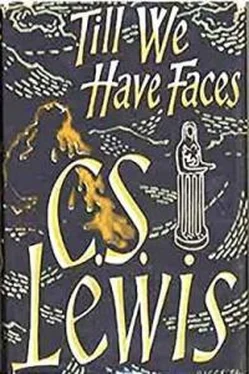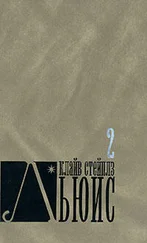My father greeted the Priest and wished him joy of his recovery and called for wine to be given him. But the Priest held up his hand and said, “No, King. I am under a strong vow, and neither food nor drink must pass my lips till I have given my message.” He spoke well enough now, though weakly, and I noticed how much thinner he was since his sickness.
“As you please, servant of Ungit,” said the King. “What’s this of a message?”
“I am speaking to you, King, with the voice of Ungit and the voice of all the people and elders and nobles of Glome.”
“Did all these, then, send you with a message?”
“Yes. We were all gathered—or those who could speak for all were gathered—last night, and even till this day’s daybreak, in the house of Ungit.”
“Were you, death and scabs?” said my father, frowning. “It’s a new fashion to hold an assembly without the King’s bidding; and newer still to hold it without bidding the King to it.”
“There would have been no reason in bidding you to it, King, seeing that we came together not to hear what you would say to us but to determine what we would say to you.”
My father’s look grew very black.
“And being gathered together,” said the Priest, “we reckoned up all the woes that have come upon us. First, the famine, which still increases. Second, the pestilence. Third, the drought. Fourth, the certain expectation of war by next spring at the latest. Fifth, the lions. And lastly, King, your own barrenness of sons which is hateful to Ungit——”
“That’s enough,” shouted the King. “You old fool, do you think I need you or any of the other wiseacres to tell me where my own belly aches? Hateful to Ungit, is it? Why does Ungit not mend it then? She’s had bulls and rams and goats from me in plenty; blood enough to sail a ship on if all was reckoned.”
The Priest jerked up his head as if, though blind, he was looking at the King. And now I saw better how his thinness had changed him. He looked like a vulture. I was more afraid of him than I had been. The King dropped his eyes.
“Bulls and rams and goats will not win Ungit’s favour while the land is impure,” said the Priest. “I have served Ungit these fifty—no, sixty–three years, and I have learned one thing for certain. Her anger never comes upon us without cause, and it never ceases without expiation. I have made offerings to her for your father and your father’s father, and it has always been the same. We were overthrown long before your day by the King of Essur; and that was because there was a man in your grandfather’s army who had lain with his sister and killed the child. He was the Accursed. We found him out and expiated his sin, and then the men of Glome chased the men of Essur like sheep. Your father himself could have told you how one woman, little more than a child, cursed Ungit’s son, the god of the Mountain, in secret. For her sake the floods came. She was the Accursed. We found her out and expiated her sin, and Shennit returned into her banks. And now, by all the signs I have reckoned over to you, we know that Ungit’s anger is far greater than ever within my memory. Thus we all said in her house last night. We all said, We must find the Accursed. Though every man knew that he himself might be the Accursed, no man spoke against it. I too—I had not a word to say against it, though I knew that the Accursed might be I; or you, King. For we all knew (and you may hold it for certain) that there will be no mending of all our ills till the land is purged. Ungit will be avenged. It’s not a bull or a ram that will quiet her now.”
“You mean she wants Man?” said the King.
“Yes,” said the Priest. “Or Woman.”
“If they think I can get them a captive in war at present, they must be mad. The next time I take a thief you can cut his throat over Ungit if you like.”
“That is not enough, King. And you know it. We must find the Accursed. And she (or he) must die by the rite of the Great Offering. What is a thief more than a bull or a ram? This is not to be a common sacrifice. We must make the Great Offering. The Brute has been seen again. And when it comes the Great Offering must be made. That is how the Accursed must be offered.”
“The Brute? It’s the first I’ve heard of it.”
“It may be so. Kings seem to hear very little. They do not know even what goes on in their own palaces. But I hear. I lie awake in the nights, very long awake, and Ungit tells me things. I hear of terrible doings in this land; mortals aping the gods and stealing the worship due to the gods——”
I looked at the Fox and said, soundlessly, by the shaping of my lips, “Redival.”
The King was walking up and down the room with his hands clasped behind his back and his fingers working.
“You’re doting,” he said. “The Brute’s a tale of my grandmother’s.”
“It may well be,” said the Priest, “for it was in her time that the Brute was last seen. And we made the Great Offering and it went away.”
“Who has ever seen this Brute?” asked my father. “What is it like, eh?”
“Those who have seen it closest can least say what it is like, King. And many have seen it of late. Your own chief shepherd on the Grey Mountain saw it the night the first lion came. He fell upon the lion with a burning torch. And in the light of the torch he saw the Brute—behind the lion—very black and big, a terrible shape.”
As the Priest said this the King’s walk had brought him close to the table where I and the Fox sat with our tablets and other tools for writing. The Fox slid along the bench and whispered something in my father’s ear.
“Well said, Fox,” muttered my father. “Speak up. Say it to the Priest.”
“By the King’s permission,” said the Fox, “the shepherd’s tale is very questionable. If the man had a torch, of necessity the lion would have a big black shadow behind it. The man was scared and new waked from sleep. He took a shadow for a monster.”
“That is the wisdom of the Greeks,” said the Priest. “But Glome does not take counsel with slaves, not even if they are king’s favourites. And if the Brute was a shadow, King, what then? Many say it is a shadow. But if that shadow begins coming down into the city, look to yourself. You are of divine blood and doubtless fear nothing. But the people will fear. Their fear will be so great that not even I will be able to hold them. They will burn your palace about your ears. They will bar you in before they burn it. You would be wiser to make the Great Offering.”
“How is it made?” said the King. “It has never happened in my time.”
“It is not done in the house of Ungit,” said the Priest. “The victim must be given to the Brute. For the Brute is, in a mystery, Ungit herself or Ungit’s son, the god of the Mountain; or both. The victim is led up the mountain to the Holy Tree, and bound to the Tree and left. Then the Brute comes. That is why you angered Ungit just now, King, when you spoke of offering a thief. In the Great Offering the victim must be perfect. For in holy language a man so offered is said to be Ungit’s husband, and a woman is said to be the bride of Ungit’s son. And both are called the Brute’s Supper. And when the Brute is Ungit it lies with the man, and when it is her son it lies with the woman. And either way there is a devouring … many different things are said … many sacred stories … many great mysteries. Some say the loving and the devouring are all the same thing. For in sacred language we say that a woman who lies with a man devours the man. That is why you are so wide of the mark, King, when you think a thief, or an old worn–out slave, or a coward taken in battle, would do for the Great Offering. The best in the land is not too good for this office.”
Читать дальше











